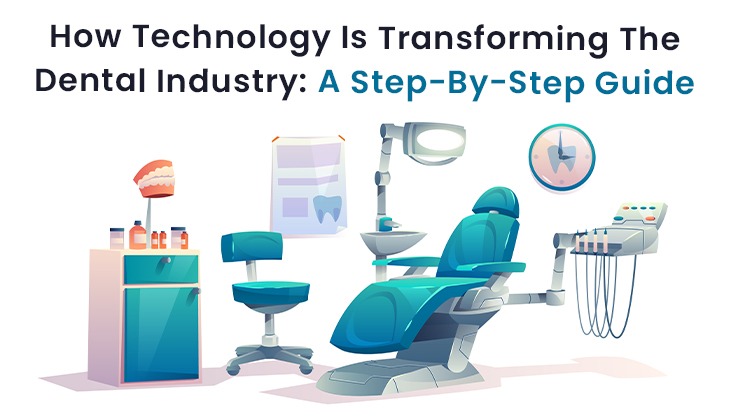Introduction
Technology is changing the dental industry. While this may be an obvious statement, it's important to understand just how significant this change has been and will continue to be. The most signTechnologyificant impact of technology on dentistry is the ability to provide better patient care at a lower cost than ever before might be surprised to learn that the dental industry has been using technology for over a century. In fact, it was one of the first industries to truly embrace modern medical advances and utilize them effectively in the practice setting. As a result, dentists have seen some tremendous advances in their abilities to provide quality care.
How Is Technology Changing Dentistry?
Technology is changing the way dentists go about their business. Dentistry used to be very traditional, but now it’s full of technological advancements that make for a better experience for patients and more efficient workflows for doctors.
New technology allows dentists to streamline every step of patient care, from booking an appointment to filing insurance forms, to sending reports directly to patients. Patients are getting easier access to their medical records too, which can help with everything from emergency care visits to scheduling root canal appointments.
The History Of Dental Technology
It is impossible to imagine our lives without dental technology. From toothbrushes to dental floss, the world of dentistry is full of interesting facts that are worth knowing about. Not long ago people had no idea that oral hygiene was important for their overall health and well-being, but now we know better.
The history of toothpaste began in China around 5000 BC when people started using crushed shells or ashes mixed with saliva as a way to clean their teeth. At first, it wasn’t really popular because the taste was unpleasant, but over time people started adding herbs and spices.
Dental Technology Today
* Teledentistry is a type of dentistry that makes use of telecommunications technology to provide dental care. Dental care practitioners can see patient data and make real-time treatment recommendations using telemedicine methods via various types of media (e.g., video), and patients can also benefit from these current technologies. Teledentistry has grown in popularity in recent years, particularly during pandemics, due to its potential for improving oral health care access, boosting efficiency, and lowering costs. Telemedicine applications are popular since they are the only option to make health care services accessible and inexpensive.
* Digital dentistry: Patients had to rely on the dentist's judgment and hope for the best in the past. When the dentist explains the treatment plan, patients can now glimpse their future smiles. Digital dentistry has become a very efficient framework for interdisciplinary dental teams because of 3D printing, digital visualization, and communication between the dentist, patient, and dental laboratory. The dentist may outsource the difficult portion of treatment planning and obtain optimized and personalized templates.
Modern dental technology has paved the way for a variety of innovative enhancements, allowing patients to achieve improved aesthetics and function. One of the most popular advancements is customized porcelain veneers, a cosmetic treatment that offers a minimally invasive solution to enhance the appearance of teeth. Crafted to mimic the natural tooth structure, these veneers provide a durable and stain-resistant option that can address issues like discoloration, gaps, or minor misalignments. With precise digital imaging, dentists can customize each veneer to match the patient's unique dental profile, making this a highly effective choice for those looking to enhance their smile without extensive procedures. This technology demonstrates how modern dentistry continues to evolve, providing patients with accessible and transformative options for dental care.
* AI stands for "artificial intelligence."
Artificial intelligence (AI) is becoming increasingly widespread in dentistry, notably in diagnostic tools. To create algorithms and make consistently correct choices based on available information, AI uses billions of data points. Based on the presented symptoms, AI algorithms can provide an accurate diagnosis. AI is capable of learning and comprehending patterns in order to provide the most likely diagnosis for any given circumstance. In identifying dental caries (cavities) via x-ray inspection, AI tools are more consistent than dental practitioners. They have an advantage over humans in identifying particular situations because of their consistency and precision.
What Can Patients Do To Prepare?
The "Yomi system," robot-assisted surgical equipment created by Neocis, a Miami-based healthcare start-up, is the first and only one authorized by the US Food and Drug Administration (FDA) for dental implant surgery. Yomi doctors can complete a full-arch implant procedure in 90 minutes and a dual-arch procedure in 2.5 hours. Robot-assisted implant surgery may become the gold standard in the future due to same-day operations, decreased surgical time, increased surgical efficiency, and considerably greater precision, all of which are coupled with a less invasive approach. To help students enhance patient care, a few dental schools in the United States have installed robot-assisted surgical equipment. Boston University's Goldman School of Dental Medicine.
A Message From Your Dentist: Thank you for choosing us!
In the end, new technologies are changing dentistry practices in ways we never imagined. However, not all of them are now cheap. Nonetheless, innovative technologies are being used by an increasing number of clinics in order to improve patient care. Dentists must be aware of and ready to change in order to remain competitive in this market.














Post Comments